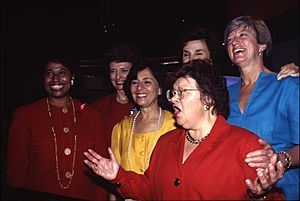Hollywood Women's Political Committee facts for kids
 |
|
| Abbreviation | HWPC |
|---|---|
| Formation | August 1984 |
| Dissolved | June 1997 |
| Type | PAC |
| Legal status | defunct |
| Headquarters | Beverly Hills, California |
|
Membership
|
300 |
The Hollywood Women's Political Committee (HWPC) was a group of American women who worked to support progressive political causes. They were like a special club that raised money and helped politicians who believed in ideas like equal rights and protecting the environment.
Famous women like Jane Fonda and Barbra Streisand started the group in 1984. They wanted to help the Democratic Party and make sure more women got involved in politics. One big reason they started was to support Geraldine Ferraro. She was the first woman to run for Vice President for a major political party in the 1984 election.
The HWPC was very successful. They helped the Democratic Party win control of the United States Senate in 1986. They also played a big part in electing Bill Clinton as president in the 1992 election. That year, 1992, was even called the "Year of the Woman" because so many women were elected to the U.S. Senate, partly thanks to groups like HWPC.
The group started with just 12 women but grew to 300 members. People called them "the most powerful entertainment group" in politics because of how much money they donated. The HWPC closed down in 1997. Over 12 years, they donated about $6 million to political causes.
Contents
Why the HWPC Was Formed
Before the HWPC, many Hollywood stars were already involved in politics. Singer and actress Barbra Streisand had been active since the 1960s. She even helped with a concert to support a presidential candidate in 1972.
Actress and activist Jane Fonda and her husband, Tom Hayden, also worked on political issues. They started a group called the Campaign for Economic Democracy in 1976. This group supported ideas like solar power, stopping nuclear power, and promoting women's rights. Jane Fonda's popular workout books and videos helped fund these efforts.
In 1984, President Ronald Reagan was running for reelection. He was a conservative politician. He often said that Hollywood was "his town" and "his people." Many liberal women in Hollywood didn't like this. They wanted to show that Hollywood also had strong liberal voices.
When Walter Mondale chose Geraldine Ferraro as his running mate in July 1984, it sparked action. Ferraro was the first woman to be a vice presidential candidate for a major party. This inspired the Hollywood women to form the HWPC in August 1984. They quickly raised $750,000 to support Mondale and Ferraro.
The HWPC grew steadily. By 1996, they had 300 members. Most members were under 45. Men could attend public meetings but could not join as members. A special committee of 14 members decided what issues the group would focus on. Activist Margery Tabankin led the HWPC for many years.
Key Campaigns and Goals

After Mondale and Ferraro lost the 1984 election, the HWPC felt that their campaign hadn't been bold enough. So, in 1985, the HWPC decided to take a strong stand on New Left issues. They focused on things like stopping nuclear weapons, opposing nuclear power, and fighting pollution.
Even though Jane Fonda wasn't involved in daily tasks, her ideas influenced the group. Many staff members had worked on political campaigns with Fonda before. The HWPC's goals were similar to those of Fonda's earlier group. They believed that all citizens should share in the country's economic wealth.
In 1986, the HWPC decided to help six Democratic candidates win their Senate races. Their goal was to help the Democratic Party gain control of the Senate. Barbra Streisand hosted a special concert at her home in September 1986. This event raised an amazing $1.5 million for the six close races. Five of the six candidates won, helping the Democratic Party become the majority in Congress. This created a balance against President Reagan's policies.
The HWPC usually focused more on issues than on specific politicians. They wanted politicians to prove their commitment to the group's principles. They didn't just accept promises.
In 1992, the HWPC helped make the "Year of the Woman" a reality. They donated nearly $200,000 to the campaigns of Dianne Feinstein and Barbara Boxer in California. Both women won their elections, making California the first state to have two women serving as U.S. senators at the same time.
In July 1992, the HWPC held a big fundraising dinner for nine women running for the U.S. Senate. Actress Lily Tomlin was the host, and Barbra Streisand gave a powerful speech. She said it was time for women to be part of the important decisions for the country and the world. The event raised $375,000 for the candidates.
The HWPC also supported LGBT rights. In 1994, they spent $10,000 to fight against two bills in Oregon and Idaho that were against gay rights. These efforts were successful. In 1996, the HWPC even launched a website, which was very new for that time!
Why the HWPC Ended
In 1994, many of the progressive ideas the HWPC supported faced challenges. Despite this, the HWPC raised $4 million for Bill Clinton's successful reelection campaign in 1996. However, some members were unhappy with President Clinton's policies.
Clinton signed a new law about welfare reform. This law made changes that especially hurt women with low incomes. Many HWPC members were upset by this. Clinton's actions showed a shift towards more central policies, which later became known as Clintonism.
The HWPC discussed these problems, but they couldn't agree on a solution. So, in April 1997, they voted to close down. They officially ended their operations in June 1997.
During its most active years, the HWPC was seen as "the most powerful political force in Hollywood." They pushed politicians to stay true to progressive ideas and acted as a strong voice for the left.
What the HWPC Believed In
The Hollywood Women's Political Committee had clear principles that guided their work:
- They believed women should have full economic equality and control over their own bodies. They opposed any laws that would interfere with a woman's personal choices.
- They supported civil rights laws and wanted to protect civil liberties. They challenged any attempts to weaken these protections.
- They believed in getting rid of nuclear weapons around the world.
- They wanted judges to be fair and follow the Constitution, not just popular political trends.
- They were committed to protecting the environment—the food, air, and water. They believed people who harmed nature should be punished.
- They wanted the United States to use its power responsibly around the world. They opposed supporting any country that violated human rights.
- They believed society should do more to provide for and educate young people, and care for older people.
- They wanted an economic system where every citizen could fully participate and share in the country's wealth. They thought focusing only on a balanced budget shouldn't be an excuse to cut social programs.
- They believed that religion and politics should be kept separate. They saw mixing them as a threat to democracy.
Notable Members
- Rosanna Arquette, actress
- Patti Austin, singer-songwriter
- Roseanne Barr, actress, comedian
- Marilyn Bergman, songwriter
- Kate Capshaw, actress
- Judy Collins, singer-songwriter
- Barbara Corday, president of Columbia Pictures
- Geena Davis, actress
- Dana Delany, actress, activist
- Laura Dern, actress
- Patricia Duff, activist
- Faye Dunaway, actress
- Shelley Fabares, actress, singer
- Morgan Fairchild, actress
- Jane Fonda, actress
- Daryl Hannah, actress
- Goldie Hawn, actress
- Melissa Manchester, singer-songwriter
- Penny Marshall, actress, director, producer
- Sarah Jessica Parker, actress
- Ally Sheedy, actress
- Cybill Shepherd, actress
- Dawn Steel, chairman of Columbia Pictures
- Mary Steenburgen, actress
- Barbra Streisand, singer, actress, director
- Anthea Sylbert, film producer
- Margery Tabankin, activist
- Marlo Thomas, actress
- Lily Tomlin, actress, comedian
- Dionne Warwick, singer
- Paula Weinstein, film and television producer
- Vanessa Williams, singer
 | Georgia Louise Harris Brown |
 | Julian Abele |
 | Norma Merrick Sklarek |
 | William Sidney Pittman |

